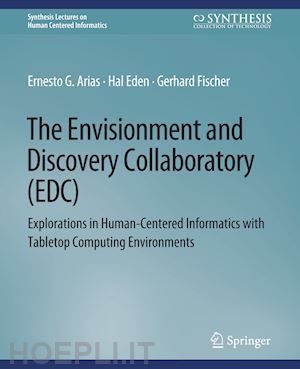Ernesto G. Arias Clare is Professor Emeritus of Planning and Design and Faculty Fellow of the Institute of Cognitive Sciences at the University of Colorado where he taught Architecture, City Planning, and Computer Science, founded the Urban Simulations Laboratory, and co-founded the Center for LifeLong Learning and Design (L3D). His Ph.D. in City and Regional Planning and Masters in Architecture and Planning are from the University of Pennsylvania. The pursuit of his research experience has been toward a contribution of the collaborative framing and resolution of design and planning problems through participation. To this end he has integrated environmental psychology and professional work on urban planning and design with the development of innovative technologies to better understand how we "behave," "think," and "learn" in trying to enhance the human competence and understanding to better design, plan, and use the built environment in the future. Activities related to the EDC development include past Fulbright Research and Teaching Scholar (participation), past chair of the National Track in Urban Design of the American Collegiate Schools of Planning (design), and past member of the International Scientific Advisory Board of the National Institute of High Technology of Costa Rica (information technology). Some of his major planning and urban design experiences include ABUJA (the New Capital City of Nigeria), and various city redevelopments in the U.S.A (planning problems). He is presently a professor at the University of Costa Rica where he founded and coordinates the Urban Observatory of the Great Metropolitan Region in Costa Rica (OUGAM). Hal Eden has been a research associate in the Department of Computer Science and the Center for LifeLong Learning and Design (L3D) at the University of Colorado Boulder. He has been associated with numerous research efforts over the past 30 years, including the design and development of technologies to support learning in thecontext of working, non-intrusive approaches to distance collaboration, and participatory design environments for face-to-face collaboration. As Associate Director of L3D, he has cultivated and supported a rich organizational, computational, and physical environment to support the L3D research community. Most recently, he has been studying the use of tangible interfaces in face-to-face collaborative settings to enhance social creativity, with specific emphasis on the assessment of interface usability and effectiveness. Gerhard Fischer is a Professor Adjunct and Professor Emeritus of Computer Science, a Fellow of the Institute of Cognitive Science, and the Director of the Center for Lifelong Learning and Design (L3D) at the University of Colorado at Boulder. He is a member of the Computer Human Interaction Academy (CHI; 2007), a Fellow of the Association for Computing Machinery (ACM; 2009), and a recipient of the RIGO Award of ACM-SIGDOC (2012). In 2015, he was awarded an honorary doctorate from the University of Gothenburg, Sweden. His research has focused on new conceptual frameworks and new media for learning, working, and collaborating, human-centered computing, and design. His recent work is centered on social creativity, meta-design, cultures of participation, design trade-offs, and rich landscapes for learning (including MOOCs).











